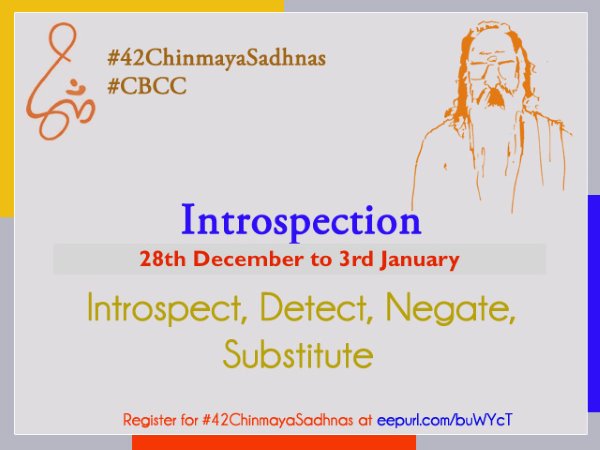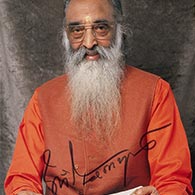Sadhana for Week 20
Intellect: Introspection
Introspection Detection Negation Substitution
Quote:
Introspect daily.
Detect diligently.
Negate ruthlessly.
Substitute wisely.
Grow steadily.
Live Happily.

Anecdote:
Poojya Gurudev Swami Chinmayananda had to go to a public meeting and asked a senior army officer to accompany him.
The officer said, “Swamiji, would you give me just a few minutes? I’ll go and change out of my uniform. Then I’ll be with you.”
Swamiji inquired, ‘Why? Are there certain things you are not supposed to do while in uniform?’
“Yes Swamiji!” was the reply.
“See that?” Continued Swamiji. “That is why my Guru said – Uniform at all times! So, even when I go to bed I wear my uniform!”
Introspections makes us a 24 x 7 seeker.
One of the best advices that Poojya Gurudev gave a devotee is:
“In introspection the mind itself is the subject of study. From time to time take a close and honest look at yourself. It pays.”
What is Introspection?
Each thought, word and deed should emerge from you bearing the seal of your own recognition. Post a portion of your attention as a sentry on the watchtower of your intellect. Let it be a silent observer of the machinations of the mind: the motives, the intentions and purposes that lie behind your every thought, word and deed.
With the intellect thus alerted to stand witness to your mind’s proceedings, no activity issues forth from you unconsciously. You are ever awake to the going-ons in your mind. This is Introspection.
In simple words, it is to be fully aware of our intentions and thoughts while acting.
What Introspection is not?
1. It is not fault finding. It is to understand our thoughts, feelings and actions so that we can integrate them
2. It is not self-condemnation.
How to?
1. Generally it is said to practice introspection at the end of the day just before going to sleep. If you are mentally upto it, please do it. If not, practice when you are mentally more fresh.
2. Sit quietly and take 5 deep breaths.
3. Order a parade of your day’s activities (previous day’s if done in the morning) within your mind: all thoughts, words, actions and emotions that transpired. Stand apart from them all and impartially review your day’s events as a silent witness. Don’t stop at any event to think about it. Merely witness the event and move on.
4. Do not use adjectives to describe these or analyze how you felt. Just see in pictures what you have done that day or previous day till the point of introspection.
5. It will be difficult in the initial stages to remember all the events. Incase you forget something and then remember later in the sequence, do not try to go back, just move on.
With consistent effort and sincere application, more activities will reveal
6. It is very important to remember that during introspection one has to merely observe the activities not criticize, analyze or correct oneself. Such criticism day-after-day may lead to cynicism or frustration in life.
7. Observation will lead to awareness of one’s strengths, goodness, achievements as well as one’s faults, weakness and animalistic tendencies in daily transactions. This stage is called detection. This process will automatically happen when introspection is done daily and sincerely.
8. Feel good for the goodness in you and strengthen your strengths. Invoke Gratitude in your heart and thank the Lord for giving you such goodness.
9. Accept the negativities without self-judgement or condemnation. Just as you would accept a tooth ache objectively without psychological judgements.
10. The moment one is aware of the negative motives, accepts them without justifying and feels ashamed of these traits, that moment they become weak. This stage is known as negation.
11. Now half the battle has been won. As soon as a weakness is detected and negated, substitute it with its opposite virtue and observe your transactions imbibing this virtue. This stage is called substitution. Soon it will become a personality trait.
12. Example, you feel you have done a good thing by helping someone by going that extra mile, feel happy about it and thank the Lord. Visualise offering it to the Lord. When you detect that you have been rude to someone and it was uncalled for, accept it as a mistake, feel the pain without justifying it. This will negate it. Substitute it by mentally seeking forgiveness from that person and if possible, go and do it physically also. Visualise harmonious interaction in future.
13. Thus this is the IDNS formula for evolution – Introspect Detect Negate Substitute
Benefits:
- Makes us emotionally strong
In a fit of emotion one gets carried away and often regrets the reaction later. Through regular introspection one is able to become aware of one’s emotional triggers and hence control and guide one’s response.
- Improves ability to face challenges in life
The problem that one faces about what one should do, or not do, when a situation arises for action is not ignorance but the non-availability of one’s intellect at such moments. Watching one’s reactions daily to situations and the corresponding effects prepares the intellect to respond effectively henceforth.
3. Another benefit is one realizes the temporary nature of feelings, thoughts situations and is able to cope with difficult situations knowing these to be passing phases in life.
- Leads to evolution
IDNS prepares the mind and intellect by integrating it and making us more conscious of our personality and actions. An integrated mind is ready for meditation.
Beginners and Advanced:
Beginner:
1. Do as advised above.
Advanced seeker:
1. Practice Introspection twice a day
2. Slowly improve the alertness of the mind and be aware 24 x 7 of the motives of the mind. This comes only by regular practice mentioned in point 1.
.jpg)
UNTO HIM OUR BEST


